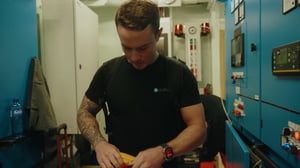
Meet our people
Meet our people
On any given weekend, you might spot Oliver scaling a cliff in Norway or running along a rugged trail, chasing that perfect adrenaline rush. But on Monday morning, his focus shifts from the mountains to the sea, where he tackles a different challenge.
As a service engineer at Norwegian Electric Systems, Oliver’s main task is to ensure that electrical and hybrid systems are installed, tested, and functioning reliably. He works to troubleshoot and optimize these systems, making sure they perform flawlessly under demanding conditions.
I’ve always been drawn to challenges, whether figuring out a climbing route or troubleshooting an issue on a ship,” Oliver says. “There’s something incredibly satisfying about solving problems in real-time.”
A day in the life of a service engineer
In Oliver’s role, every day looks different. One week, he might be running tests at NES’s facilities in Bergen to ensure that systems operate efficiently. The next, he could be halfway across the world, overseeing a sea trial off the coast of Turkey.
As a service engineer, Oliver’s work takes him from shipyards to ferry ports, where he oversees and troubleshoots an intricate network of systems – every- thing from generators and switchboards to energy storage solutions, drives, transformers, and power management systems.
Testing these power systems is essential, and much of this is done at NES’s headquarters in Bergen. The process starts with rigorous testing of the systems before they’re shipped to a vessel, ensuring they function as designed. Once on board, he supervises the installation and integration of these systems, making sure everything is set up according to our standards.
With the ship still docked, Oliver conducts thorough tests to confirm the systems work in a controlled environment. Then comes the ultimate test: sea trials. During this phase, Oliver collaborates closely with software engineers to ensure that every component, from drives to batteries, performs flawlessly under real-world conditions at sea. Once the sea trials are complete and the systems are approved, the ship is ready to sail.


As the systems are approved, Oliver’s work on that particular vessel comes to an end. However, he might find himself back on board later, as the ship will be followed up with planned maintenance, implementing system updates or troubleshooting to keep the vessels running optimised long after they leave the shipyard.
Every day brings new challenges, but for Oliver, this blend of hands-on problem-solving and high-tech precision is what makes the role so rewarding.
From navy decks to engineering precision
Oliver’s technical journey started long before he joined NES. After working as an energy technician – scaling utility poles and replacing masts – he spent two years in the Norwegian Navy.
Aboard frigates, he gained hands-on experience with electrical systems, working as an electrician and machinist. These years, he laid a strong foundation for his work at NES, where he now combines his technical skills with a deep understanding of marine power systems.
You need to be prepared for anything in this line of work. The Navy taught me to adapt, stay calm, and focus, no matter what’s happening around you.

